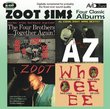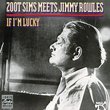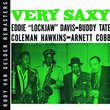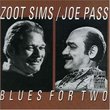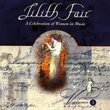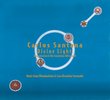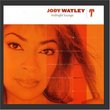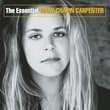| All Artists: Zoot Sims, Eddie Lockjaw Davis Title: Tenor Giants Featuring Oscar Peterson Members Wishing: 3 Total Copies: 0 Label: Pablo Original Release Date: 1/1/1975 Re-Release Date: 2/13/2001 Genres: Jazz, Pop Style: Cool Jazz Number of Discs: 1 SwapaCD Credits: 1 UPC: 025218096928 |
Search - Zoot Sims, Eddie Lockjaw Davis :: Tenor Giants Featuring Oscar Peterson
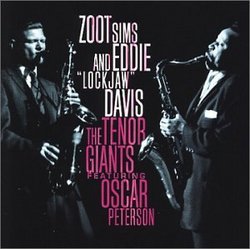 | Zoot Sims, Eddie Lockjaw Davis Tenor Giants Featuring Oscar Peterson Genres: Jazz, Pop
|
Larger Image |
CD DetailsSimilar CDs
Similarly Requested CDs
|
CD Reviews4 and 1/2 Stars - Swinging, Joyous Tenor Jazz John Tapscott | Canada | 02/02/2002 (4 out of 5 stars) "Zoot Sims and Eddie "Lockjaw" Davis were two of the most distinctive and swinging tenor saxophonists to come out of the late swing/early bop era. Each had a very personal style and you would never mistake one for the other. But they made a very compatible two tenor team on this CD which has 8 tracks taken from 5 European concerts in the fall of 1975. The CD is just full of swinging jazz joy which pours forth from these veterans. Sims and Davis seem to inspire one another to heights of improvisational excellence. They appear together on six tracks while each has a ballad feature for himself. The tunes, as expected, are all high-class standards with the one exception being Dizzy Gillespie's great line "Groovin' High." Sims and Davis are backed by the very best rhythm section that can be imagined - Oscar Peterson, piano; Niels Henning Orsted Peterson, bass; and Louis Bellson, drums. I don't think I've ever heard Bellson play better in a small group setting than he does here. Peterson reaffirms his status as the best all-around jazz pianist, soloing brilliantly but never stealing the show, and setting up each tune beautifully with his intros and comping. My only quibble with this CD is the very average recording quality. The saxophonists are sometimes a bit off-mike, particulary on the last two tracks, where you have to listen very carefully to catch the full detail and richness of their playing. Overall however, this wonderful CD is one of the most uplifting and joyous jazz recordings I've heard in quite a while. Highly recommended." Geniuses of a bygone era M. Ritter | Montreal, Canada | 03/22/2008 (5 out of 5 stars) "One of the Best CDs in my jazz collection. I've been an OP fan all my life. Having studied piano as a teenager, I do know what it means playing like Oscar. If the 100m world record is somewhere between 8 and 9 sec. then Oscar could do it in 5 sec. (pianistically speaking). And then, all on the spur of the moment..True genius...There will never be another Oscar. While his playing ability in the mid-70s started to slightly diminish, he is in splendid form in this recording done in 1975. What can I say about the 2 tenor sax players...Unbelievable! While I always liked Zoot Sims for his wonderful sound, Lockjaw is trully unbelievable. He is the best! I highly recommend this CD to all those who have an ear for and understanding of jazz." Misleading title: Tenor Giants Magnified by Oscar's Support Samuel Chell | Kenosha,, WI United States | 05/30/2010 (5 out of 5 stars) "This one popped up among the thousands coming through my earphones, and I almost stopped dead in my tracks (until realizing that the treadmill wouldn't allow it). The first number was "Ghost of a Chance," a version I hadn't heard, but the sound, the lyricism, the quotations, the warmth--it had to be Zoot Sims. But I've been fooled before--what if it was Al Cohn, or Spike Robinson, or Stan Getz, or that "impostor," Scott Hamilton? I'd be humiliated, even if only to myself. But then it was the 2nd horn's turn--without a shred of doubt, Lockjaw Davis. And Jaws' horn narrowed the possibilities of the first player's identity: Zoot it was.
In the '70s, when things were often bleak for mainstream players, I was privileged to hear four "tough tenors" on the same bandstand at least once every month, thanks to Joe Segal's policy at the Jazz Showcase and the modest rates that some of these legendary players would play for. The marquee players in the fusion bands (Wayne Shorter, for example) or the carefully-guarded reputations (Sonny Rollins) never appeared in these loose, "cutting contest"-type sessions, but that left plenty to choose from--Sonny Stitt and Jug, Dexter and James Moody, Al and Zoot, Don Byas, Harold Land, Stanley Turrentine, Johnny Griffin, Ira Sullivan, Hank Mobley (sadly out of shape), Allen Eager (even more so), Jimmy Forrest, Clifford Jordan, Eddie Harris, etc. On more than one occasion, it was Jaws, with that lithe, skip-a-long rhythmic phrasing and canny control of top tones, who turned a lackluster session into an unforgettable, out-of-body experience, playing a solo that literally picked up the entire rhythm section and made the local drummer, Wilber Campbell, sound like Sonny Payne driving the Basie band or like the deceptively diminutive Bobby Durham driving Oscar's trio. Jaws, it would seem, could have his way with anyone. But as recordings have shown, that wasn't necessarily always the case. As good as his solo is on "Ghost of a Chance," it can't quite match Zoot's, and on a studio recording he did with Tommy Flanagan, his tenor is simply a tad "too" tough to force everyone into the same groove pocket and dynamic level. No such disparities on this recording. With Oscar's sympathetic support (and empathetic rapport) in synch with each player's idiosyncrasies, there's no way each can't sound his best, excelling at what he does best. In Zoot's case, no one ever played "Ghost of a Chance" with more tender care and open-hearted feeling. Whenever these guys were playing "with" Oscar, there was always the innate understanding that they were also playing "for" Oscar. Lesser players would no doubt get rattled; giants such as Zoot and Jaws merely rise to the uppermost level of their singular talent." |

 Track Listings (8) - Disc #1
Track Listings (8) - Disc #1